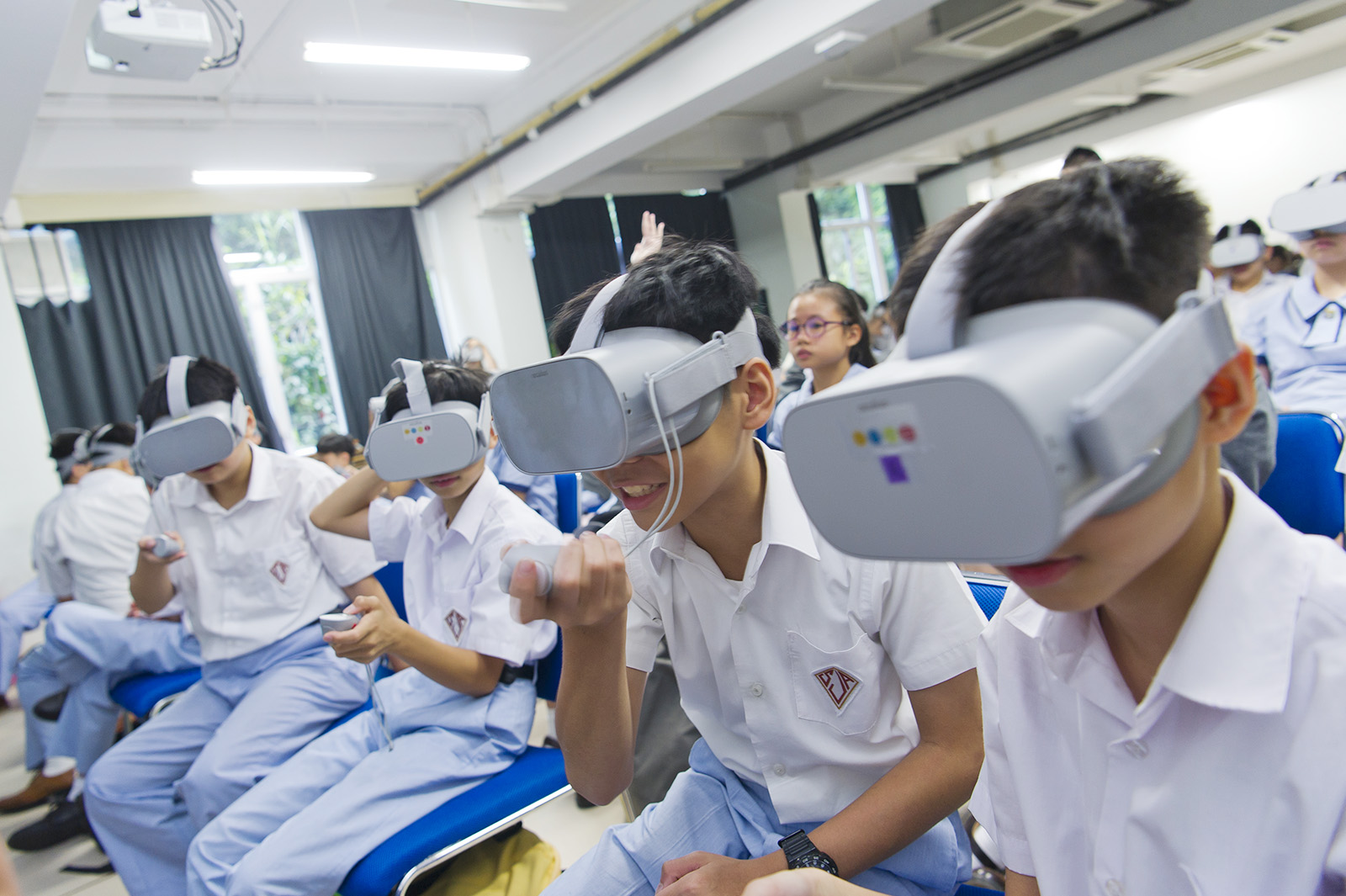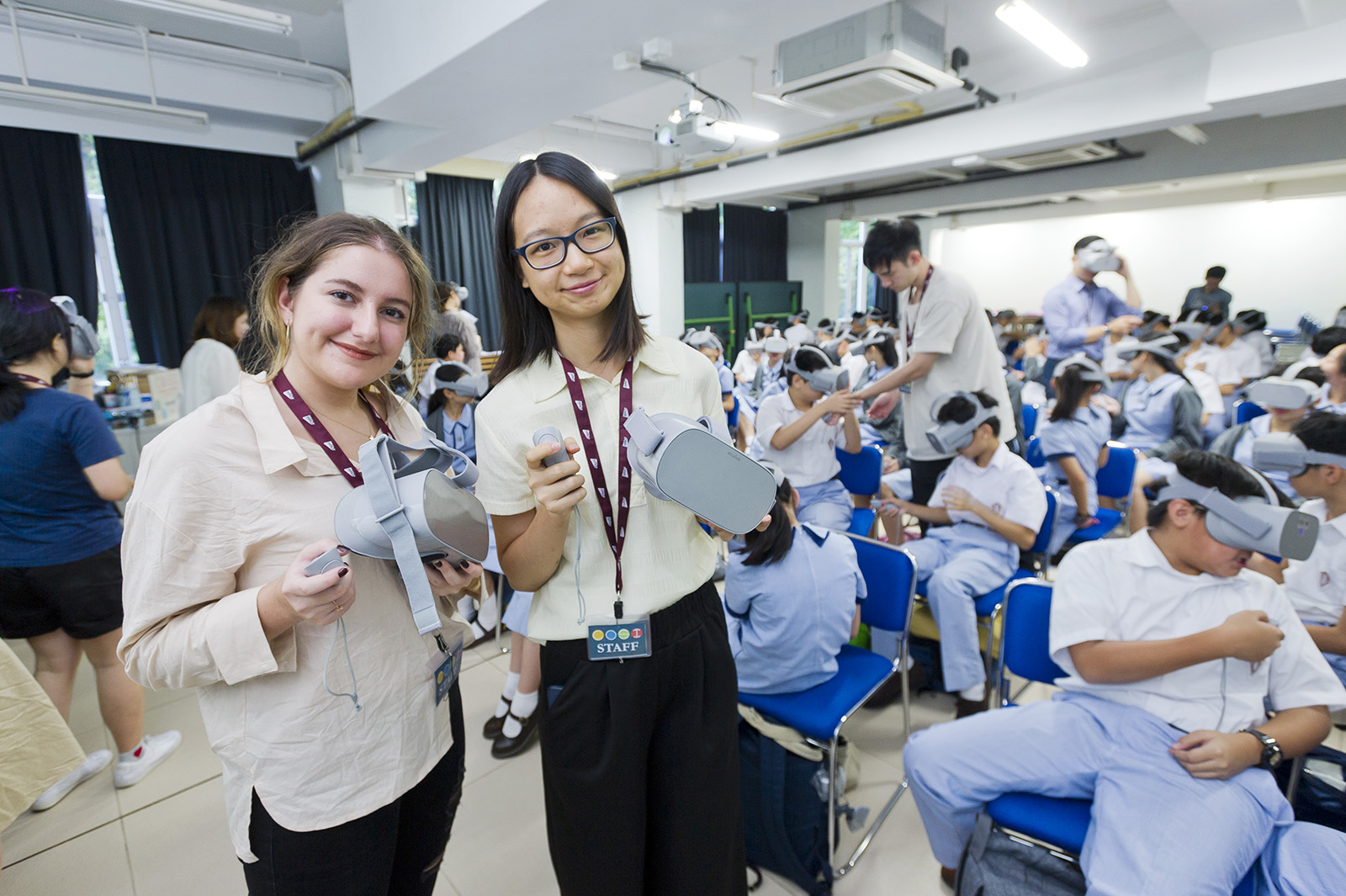Cultural workshops strengthen social inclusion through VR

Nearly 1,300 primary and secondary school students have attended social inclusion workshops using virtual reality (VR) through the Companions of Social Inclusion (COSI) Programme of City University of Hong Kong (CityU).
The aim is to enhance young people’s understanding about the culture and ways of living of ethnic minorities. Since October 2018, workshops have been held in 31 schools. COSI is part of the Jockey Club Enhancing Youth Empathy Project through Immersive Visualisation, which is funded by The Hong Kong Jockey Club Charities Trust and led by CityU.
By deploying CityU’s strengths in immersive visualisation technology, the Project encourages young people to develop skills through “perspective-taking” and “role-taking” and to create innovative solutions that help people in need deal with challenges and problems.
Professor Horace Ip Ho-shing, Coordinator of COSI and CityU’s Vice-President (Student Affairs), said a series of training workshops combined with the application of VR technology organised by COSI enabled young people to understand the challenges and difficulties that ethnic minority groups face in Hong Kong.
The workshops also enhance cognitive and affective understanding, nurture their empathy and promote social inclusion. At the same time, they strengthen ethnic minority students’ coping skills and management capability in core domains of everyday life.
“The outcomes of these efforts will leave a deep and lasting impact on the values of our young people, which, in turn, will positively influence their peers and society as a whole,” Professor Ip said.

Participants at one of the workshops organised recently at St. Joan of Arc Secondary School on 20 September had the chance to put on a VR headset and step into a VR world where they visited a mosque, the homes of ethnic minority groups, a halal butcher’s store, a grocery store and marts selling traditional snacks.
The VR video was produced using 360-degree panoramic photography that allows participants to feel like they are there in the scene, while people from ethnic minority groups introduces and explains the background and meaning behind their ways of living, clothing, food and religious rituals.
In addition, non-Chinese speaking students taking part in the workshops found out more about local organisations that provide services to ethnic minority groups.
St. Joan of Arc Secondary School, which teaches local and non-Chinese speaking students, has participated in several workshops. Ms Wong Yuen-wa, a teacher at the school, said that students offered positive feedback. “It was a novel learning experience for the students, which could leave a deep impression on them. Although local students interact with non-Chinese speaking students on campus, they might not know much about their culture. The workshops offer insight from a first-person’s point of view,” she said.
Besides, COSI recruits CityU students as programme ambassadors who promote educational activities at primary and secondary schools. They join activities such as training workshops on the applications of VR technology, seminars for exchanging ideas with ethnic minority groups and representatives from relevant non-governmental organisations, community visits and on-site studies. These activities enhance students’ understanding of and empathy for the challenges that ethnic minority groups face in Hong Kong.
Wong Ching-yi, a Year 4 student in the Department of Management at CityU who has joined the Programme for two years, said she was deeply encouraged when seeing participants, particularly ethnic minority groups, actively take part in the activities held at secondary schools or local communities.
Before joining the Programme, she seldom interacted with minority groups and knew very little about their culture and way of life. The Programme has broadened her horizons and encouraged her to make friends with students from minority groups, she said.
“In the past, I only knew that they usually wear robes and hijab, and they don’t eat pork, but I hadn’t tried to understand the reasons behind that. However, after knowing more, we become even more respectful of the unique meanings of different cultures,” she said.
She also felt that there is still insufficient support and resources for the groups. She wishes to continue to take part in related community services after graduating.
Izgi Kocacelebi, a Year 3 Turkish student in the Department of Systems Engineering and Engineering Management at CityU who came to Hong Kong three years ago, said she had a good impression of Hong Kong as she feels that local people are receptive to different ethnic groups.
Through the COSI programme, she wants to know more about the promotion of cultural inclusion in Hong Kong and foster the idea of inclusion through VR technology. Also, she wishes to interact more with local students.
With an approved donation of more than HK$15 million from The Hong Kong Jockey Club Charities Trust, CityU launched the Jockey Club Enhancing Youth Empathy Project through Immersive Visualisation in January 2017. The project is led by Professor Matthew Lee, Vice-President (Development and External Relations) and it comprises three programmes, namely COSI, Technologies for the Elderly and Disabled people by Youths (TEDY) and Walking with Omura’s Whale (WOW). The Project aims at nurturing young people’s empathy for nature and the environment, the elderly and disabled, and ethnic minority groups.